Pretty Gerlinde Locker (1938) is an Austrian stage, television and film actress, who appeared in many Heimatfilms and film operettas of the late 1950s and early 1960s. From 1956 on, she appeared in more than 30 Austrian and West-German films.
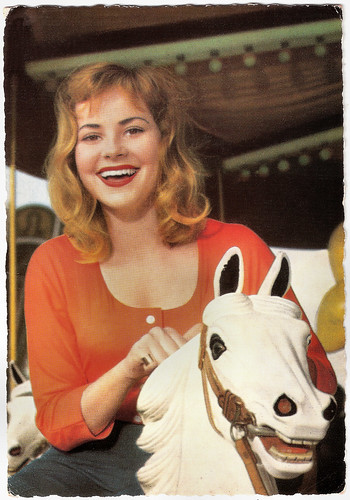
German postcard by WS-Druck, Wanne-Eickel, no. F 82. Photo: Filmpress Zürich.
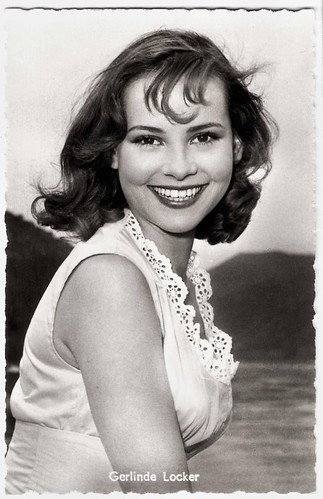
German postcard by Kolibri-Verlag, Minden/Westf. no. 2640. Photo: Stempka.
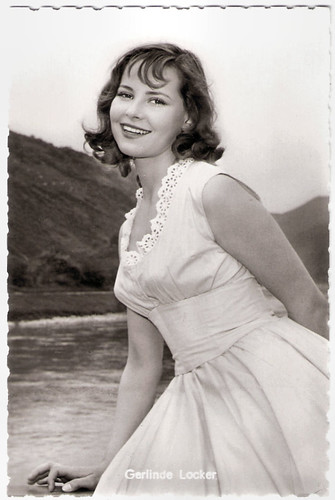
German postcard by Kolibri-Verlag, Minden/Westf., no. 2845.
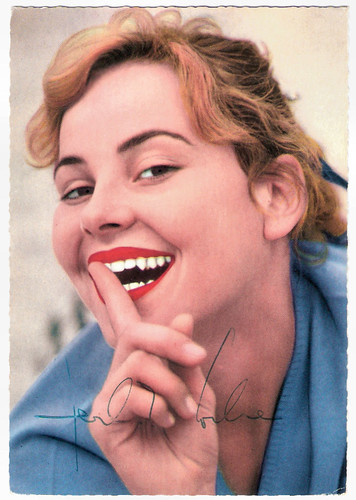
German postcard by ISV, no. J2. Photo: Union-Film.
Gerlinde Locker was born in 1938, in Linz, Austria. She attended a school for applied arts and trained to become a weaver. However, she also studied drama school at Bruckner-Konservatorium (the Bruckner Conservatory) in Linz, and at 18, she made her stage debut at the Mozarteum in Salzburg.
In 1957, she received her first engagement at the Landestheater Linz. She made her first film appearance in the Austrian-German Heimatfilm Der Schandfleck/The Eyesore (Herbert B. Fredersdorf, 1956). After this successful film debut she received a five-year contract from the Vienna production company Schönbrunn film.
She played the female lead in the West German musical comedy Der Stern von Santa Clara/The Star of Santa Clara (Werner Jacobs, 1958) starring Vico Torriani. She appeared in a supporting part in the romantic comedy Schick Deine Frau nicht nach Italien/Do Not Send Your Wife to Italy (Hans Grimm, 1960) starring Marianne Hold.
One of her better films was Morgens um Sieben ist die Welt noch in Ordnung/In the Morning at Seven the World Is Still in Order (Kurt Hoffmann, 1968). From 1962 on, she played at the Theater in der Josefstadt in Vienna, at the Renaissance Theater Berlin, the Thalia Theater in Hamburg and other German stage venues. In 1968 and 1969 she made guest appearances at the famous Salzburger Festspielen at the side of O. W. Fischer.
During the 1960s Locker also appeared in TV operettas, such as Die Fledermaus/The Bat, Die Christel von der Post, Der Vogelhändler/The Bird Seller and Das Land des Lächelns/The Land of Smiles.
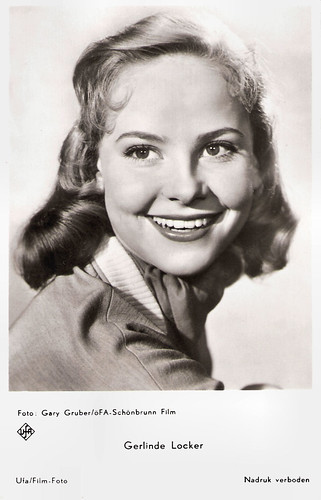
German postcard by Ufa, Berlin-Tempelhof., no. FK 3757. Photo: Gary Gruber / öFA-Schönbrunn-Film / NF. Publicity still for Der Jungfrauenkrieg/The Virgin War (Hermann Kugelstadt, 1957).
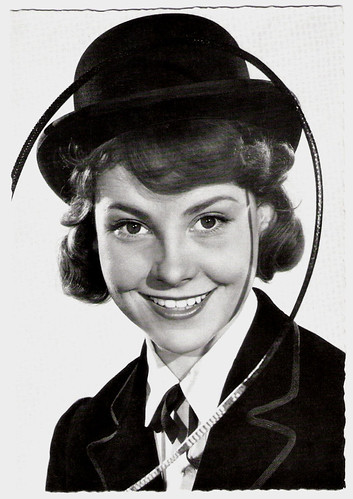
German postcard by WS-Druck, Wanne-Eickel, no. 380.
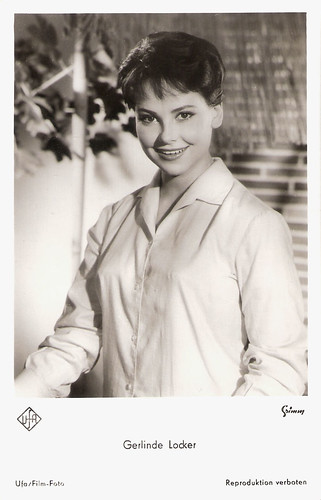
German postcard by Ufa, Berlin-Tempelhof, no. FK 4312. Photo: Arthur Grimm.

Dutch postcard by Gebr. Spanjersberg NV, Rotterdam, no. 3757. Photo: Gary Gruber / öFA-Schönbrunn-Film / NF. Publicity still for Der Jungfrauenkrieg/The Virgin War (Hermann Kugelstadt, 1957). See the German version above.
During the 1970s, Gerlinde Locker kept appearing incidentally in West German comedies like Heintje – Einmal wird die Sonne wieder scheinen/Heintje: Once the Sun will shine again (Hans Heinrich, 1970) with Dutch child star Heintje, and Auch ich war nur ein mittelmäßiger Schüler/I Wasn't a Very Good Student Either (Werner Jacobs, 1974).
But she focused on TV work. Among her television roles are guest appearances in the Krimi series Der Kommissar/The Police Inspector (1970-1975) and Derrick (1981-1993).
She did not return to the screen until a decade later with appearances in television plays. These included her role as Liselotte von Rheinberg in the family saga Geld.Macht.Liebe/Money.Power.Love (2009) and a guest role in the Krimi series SOKO 5113 (2007-2010).
She also returned to the cinema as Lady Arista in the Fantasy film Rubinrot/Ruby (Felix Fuchssteiner, 2013) with Josefine Preuß. It was based on the first book of the Gems trilogy by Kerstin Gier.
From her marriage with director Kurt Wilhelm she has a son, the journalist Anatol Locker (1963). Since 1974 she has been married to the actor Richard Rüdiger. Gerlinde Locker lives in Munich.
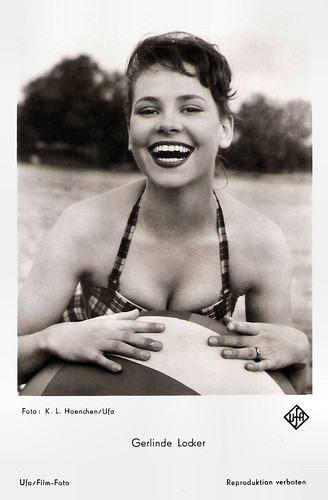
German postcard by Ufa, Berlin-Tempelhof, no. FK 4159. K.L. Haenchen / Ufa. Publicity still for Man müßte nochmal zwanzig sein/One would have to be twenty again (Hans Quest, 1958).
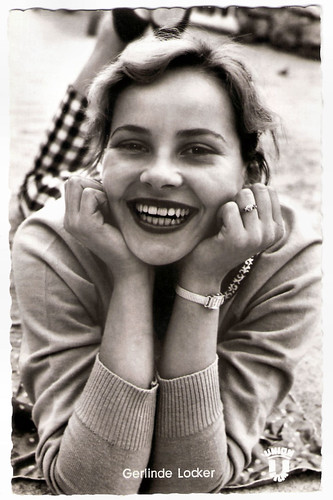
German postcard by Kolibri-Verlag, Minden/Westf., no. 2297. Photo: Union-Film. Publicity still for Dort oben wo die Alpen glühen/Up there where the Alps glow (Otto Meyer, 1956).
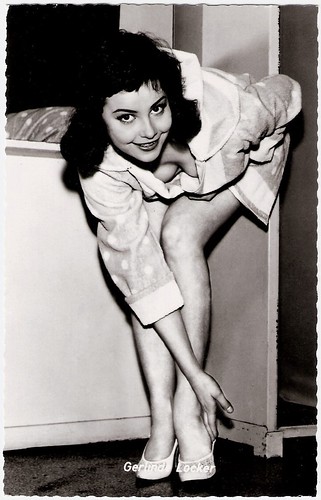
German postcard by Kolibri-Verlag, Minden/Westf, no. 675.
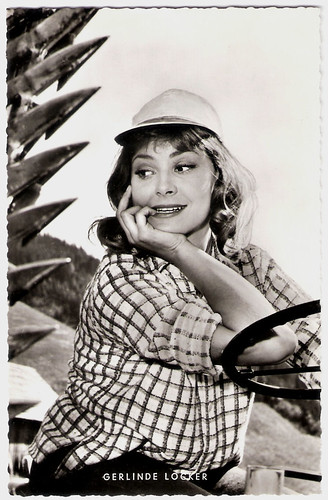
German postcard by Kunst und Bild, Berlin, no. A 1648.
Sources: Wikipedia (German and English) and IMDb.
This post was last updated on 28 March 2025.

German postcard by WS-Druck, Wanne-Eickel, no. F 82. Photo: Filmpress Zürich.

German postcard by Kolibri-Verlag, Minden/Westf. no. 2640. Photo: Stempka.

German postcard by Kolibri-Verlag, Minden/Westf., no. 2845.

German postcard by ISV, no. J2. Photo: Union-Film.
In the morning at seven, the world is still in order
Gerlinde Locker was born in 1938, in Linz, Austria. She attended a school for applied arts and trained to become a weaver. However, she also studied drama school at Bruckner-Konservatorium (the Bruckner Conservatory) in Linz, and at 18, she made her stage debut at the Mozarteum in Salzburg.
In 1957, she received her first engagement at the Landestheater Linz. She made her first film appearance in the Austrian-German Heimatfilm Der Schandfleck/The Eyesore (Herbert B. Fredersdorf, 1956). After this successful film debut she received a five-year contract from the Vienna production company Schönbrunn film.
She played the female lead in the West German musical comedy Der Stern von Santa Clara/The Star of Santa Clara (Werner Jacobs, 1958) starring Vico Torriani. She appeared in a supporting part in the romantic comedy Schick Deine Frau nicht nach Italien/Do Not Send Your Wife to Italy (Hans Grimm, 1960) starring Marianne Hold.
One of her better films was Morgens um Sieben ist die Welt noch in Ordnung/In the Morning at Seven the World Is Still in Order (Kurt Hoffmann, 1968). From 1962 on, she played at the Theater in der Josefstadt in Vienna, at the Renaissance Theater Berlin, the Thalia Theater in Hamburg and other German stage venues. In 1968 and 1969 she made guest appearances at the famous Salzburger Festspielen at the side of O. W. Fischer.
During the 1960s Locker also appeared in TV operettas, such as Die Fledermaus/The Bat, Die Christel von der Post, Der Vogelhändler/The Bird Seller and Das Land des Lächelns/The Land of Smiles.

German postcard by Ufa, Berlin-Tempelhof., no. FK 3757. Photo: Gary Gruber / öFA-Schönbrunn-Film / NF. Publicity still for Der Jungfrauenkrieg/The Virgin War (Hermann Kugelstadt, 1957).

German postcard by WS-Druck, Wanne-Eickel, no. 380.

German postcard by Ufa, Berlin-Tempelhof, no. FK 4312. Photo: Arthur Grimm.

Dutch postcard by Gebr. Spanjersberg NV, Rotterdam, no. 3757. Photo: Gary Gruber / öFA-Schönbrunn-Film / NF. Publicity still for Der Jungfrauenkrieg/The Virgin War (Hermann Kugelstadt, 1957). See the German version above.
I wasn't a very good student either
During the 1970s, Gerlinde Locker kept appearing incidentally in West German comedies like Heintje – Einmal wird die Sonne wieder scheinen/Heintje: Once the Sun will shine again (Hans Heinrich, 1970) with Dutch child star Heintje, and Auch ich war nur ein mittelmäßiger Schüler/I Wasn't a Very Good Student Either (Werner Jacobs, 1974).
But she focused on TV work. Among her television roles are guest appearances in the Krimi series Der Kommissar/The Police Inspector (1970-1975) and Derrick (1981-1993).
She did not return to the screen until a decade later with appearances in television plays. These included her role as Liselotte von Rheinberg in the family saga Geld.Macht.Liebe/Money.Power.Love (2009) and a guest role in the Krimi series SOKO 5113 (2007-2010).
She also returned to the cinema as Lady Arista in the Fantasy film Rubinrot/Ruby (Felix Fuchssteiner, 2013) with Josefine Preuß. It was based on the first book of the Gems trilogy by Kerstin Gier.
From her marriage with director Kurt Wilhelm she has a son, the journalist Anatol Locker (1963). Since 1974 she has been married to the actor Richard Rüdiger. Gerlinde Locker lives in Munich.

German postcard by Ufa, Berlin-Tempelhof, no. FK 4159. K.L. Haenchen / Ufa. Publicity still for Man müßte nochmal zwanzig sein/One would have to be twenty again (Hans Quest, 1958).

German postcard by Kolibri-Verlag, Minden/Westf., no. 2297. Photo: Union-Film. Publicity still for Dort oben wo die Alpen glühen/Up there where the Alps glow (Otto Meyer, 1956).

German postcard by Kolibri-Verlag, Minden/Westf, no. 675.

German postcard by Kunst und Bild, Berlin, no. A 1648.
Sources: Wikipedia (German and English) and IMDb.
This post was last updated on 28 March 2025.
No comments:
Post a Comment